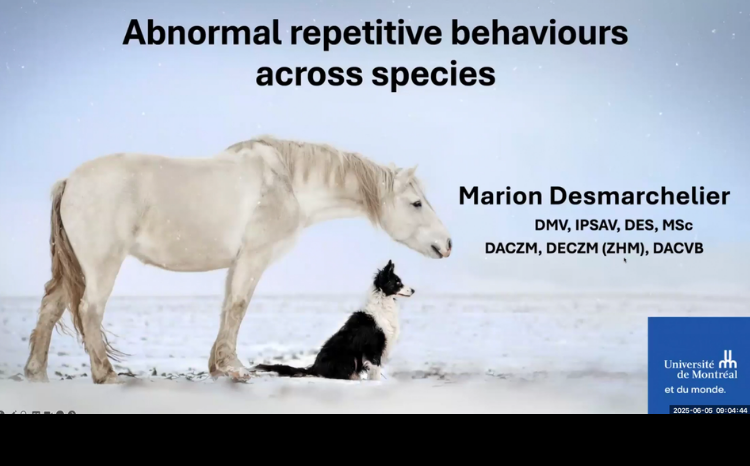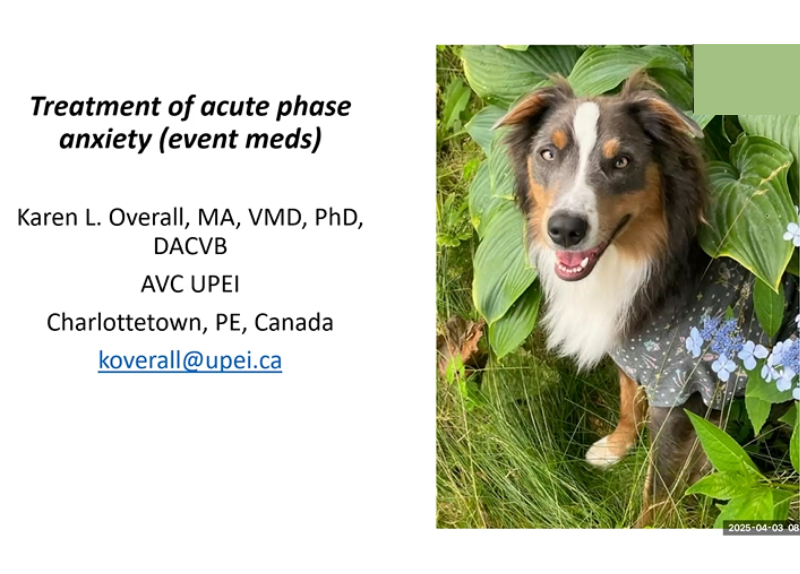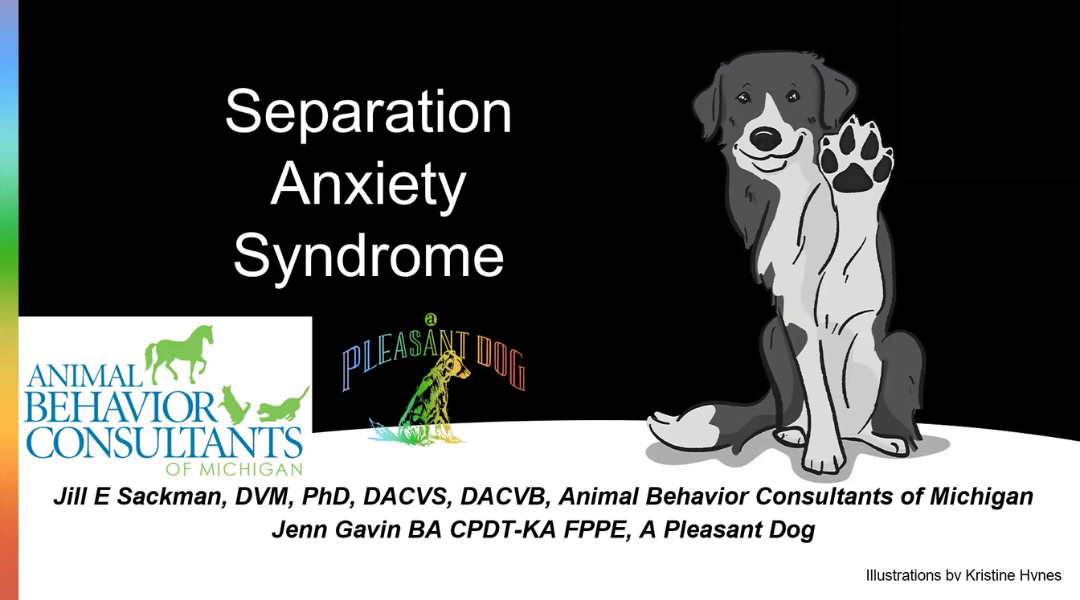
Repetitive, compulsive, stereotypical behaviours and even self-mutilation are behaviours that are present in many different species and are as difficult to understand as they are to treat. However, recent discoveries allow us to better comprehend the pathophysiology of these diseases and in particular their evolutionary origin.
With the improved analysis of these diseases, we have new tools to make more accurate diagnoses and more effectively treat patients with these conditions.

In this session we will review the tools we have for assessing pain in the acute and chronic setting. We will consider these with the challenging behaviour case in mind and ask how we might adapt these tools for this context.
With pain trials being a useful option in our painful behaviour patients, we consider treatment options and how to assess efficacy.

Ideally, psychopharmacological treatment should be addressing the known, or hypothesized, underlying mechanism causing the pathology and/or dysfunction. Medications are seldom chosen that way and too often we forget that patterns of behaviour within the diagnosis may suggest some mechanistic heterogeneity and treatment opportunities.
Patients all express their own variations of diagnostic pathology, and redress of individual variation has a role in treatment. Additionally, no behavioural pathology appears de novo as fully developed and no event of the pathology's expression is all or nothing. Within both of those types of variability are treatment opportunities that are often overlooked.
This talk will focus on the treatment of acute phase and acute anxiety based and which medications may be excellent first medications to try

Separation anxiety can be one of the most frustrating and concerning issues that faces dogs, their owners and their vets.
This talk will cover ways separation anxiety can present, underlying causes and predisposing factors, prognosis and a systematic way to go about diagnosing, treating and managing this behavioural challenge. We will discuss common comorbidities, medication options and essential elements of successful behavior modification.
This talk is aimed at veterinarians who work in companion animal practice, in shelters and rescues, and in veterinary behavioural medicine.

Dr Jacqui Ley (double-boarded and registered specialist in Veterinary Behavioural Medicine) presents an online seminar on the influences of maternal health, in-utero development, postnatal environment and learning on canine development and behaviour.
Much has been learnt recently in the fields of epigenetics, maternal health and neuroscience on how young brains develop and function in the world during the first few months. Jacqui discusses influential factors and their effects both in the young pup and on the adult dog, and provide insight as to how to apply this learning to the veterinary patients in your care. Join us for a thought-provoking and engaging presentation on contemporary literature and thinking.
This webinar is aimed at Veterinary Specialists and Residents (both in Veterinary Behaviour and other specialties), Members of the Veterinary Behaviour Chapter and General Practitioner Veterinarians wishing to deepen their knowledge and grow their skills in managing their veterinary patients.
Jacqui graduated from the University of Melbourne and worked in companion animal practice after graduation. Whilst studying, she recognised veterinary behavioural medicine as an area that brought together her interests in animal behaviour, animal training and the functioning brain. She obtained her membership to the Veterinary Behaviour Chapter of the Australian and New Zealand College of Veterinary Scientists (ANZCVS) in 2000. Jacqui completed her PhD, through Monash University, describing a model and building a questionnaire for assessing canine personality. She has also described the factors that affect the relationships between an owner and their dog. Other research interests include the human-animal bond and factors affecting this; tests for measuring fear and other behaviours in dogs; and the social relationships in dogs and cats. She has tutored for the Graduate Certificate in Animal Welfare at Monash University and is a current tutor for the Sydney University Centre of Veterinary Education Distance Education Course on Behavioural Medicine.
In 2011 she became a diplomat of the European College of Animal Welfare and Behavioural Medicine - one of two people to hold this qualification in Australia. Jacqui was awarded a Fellowship to the ANZCVS in the Chapter of Veterinary Behaviour at Science Week 2013. She sees behaviour cases on a regular basis at Melbourne Veterinary Specialist Centre. Jacqui is a regular presenter at international and national conferences, mentors Veterinary Behaviour Medicine Residents and is the Chairperson for the Delta Expert Advisory Commitee.
Presented by triple-boarded Veterinary Behaviourist and registered Veterinary Specialist in Animal Behaviour, Dr Kersti Seksel, this seminar is aimed at veterinarians with a keen interest in veterinary behavioural medicine, residents in veterinary behaviour, as well as veterinarians (both Specialists and Residents) working in other fields that would like to improve the care of their patients.
Kersti graduated in Veterinary Science from the University of Sydney. She has a Bachelor of Arts in Behavioural Sciences with a major in psychology as well as a Master of Arts (Hons). She is a Fellow of the Australian College of Veterinary Scientists in Animal Behaviour, a Diplomate of the American College of Veterinary Behaviorists and a Diplomate of the European College of Animal Welfare and Behavioural Medicine. Kersti is an adjunct Professor in Veterinary Behaviour at University of Queensland, head tutor for the Distance Education course in Behavioural Medicine for Centre for Veterinary Education, University of Sydney, regularly presents at conferences nationally and internationally, has written many papers, text book chapters, a book, Training Your Cat, and is regularly asked for media interviews. She created Puppy Preschool® and Kitten Kindy®.

Dr Gabrielle Carter, Board Certified Veterinary Behaviourist and registered Veterinary Specialist in Animal Behaviour, presents a webinar to veterinarians on how to optimise patient recovery post-surgery by addressing their physical, emotional and behavioural needs.
This seminar is aimed at veterinarians with a keen interest in behaviour, residents in the Veterinary Behaviour field, and veterinarians working in other fields that would like to improve the care of their patients.
Dr Gabrielle currently works at the RSPCA in Victoria as the Animal Behaviour and Rehabilitation Specialist. Her commitment to improving animal welfare has seen her work with several shelters, in private practice, and served on various animal ethics committees where she helps improve the quality of life for pets and their owners on a daily basis.
Dr Anne Jackson, veterinarian, author, biomedical researcher, writer, publisher and photographer, gives an interactive webinar on how you can write a scientific case report for publication.
If you don’t have much experience in scientific writing, the prospect of writing an academic article or case report can be daunting. Anne covers the critical points of where to start, how to keep going and how to improve your confidence in submitting your article to a scientific journal.
This webinar is aimed at veterinarians interested in growing their skills, including residents in all fields who need to write that ‘first article’ and those more experienced writers who would like an insider’s perspective.
Dr Anne Jackson has worked in general veterinary practice, medical and biomedical research, completed a PhD in Medicine, as a government veterinarian, freelance medical and technical writer, and editor. Anne was appointed Scientific Editor and then Editor in Chief of the Australian Veterinary Journal (AVJ) in 2005 and was a passionate advocate for the quality and integrity of the Journal for 14 years. She now runs her consultancy, A Vet Lens Publishing and Photography, advising on the academic publishing process by simplifying the process and cutting through the jargon.
Her mission is to mentor authors to translate their formless ideas or complicated biomedical drafts into streamlined and focused case reports and articles that give the key messages for their target audiences.

Feather Picking in Pet Birds - What's going on?
Presented by Dr. Bronwen Bollaert BVSc MSc MANZCVS (Veterinary Behaviour) Resident of the European College of Animal Welfare and Behavioural Medicine.
Feather Picking can be one of the most frustrating and concerning issues that face pet birds, their owners and their vets. This talk will cover some of the ways feather picking can present, some of the underlying causes and predisposing factors, and a systematic way to go about diagnosing, treating and managing this behavioural challenge. This talk is aimed at veterinarians who work in avian, exotic and zoo medicine, veterinary behavioural medicine and general practitioners with an interest in birds.
Dr. Bronwen Bollaert completed her undergraduate training in South Africa in 2002. She has worked in Zoo medicine, small animal private practice and welfare, and completed her Masters in infectious diseases in African Buffalo. In 2018 Bronwen gained her Memberships in Veterinary Behaviour with the ANZCVS and is the immediate past President for the Chapter. She owns and runs Healthy Pet Behaviour Services, a behaviour referral service in Brisbane, Australia, and is a resident of the European College of Animal Welfare and Behavioural Medicine.
She is actively involved in promoting awareness of mental health in animals and enjoys engaging clients, colleagues and the greater community in this fascinating field.

Presented by Dr Isabelle Resch VET278 (ACT), BVSc(Hons),MVS, MANZCVS (SA Medicine, Vet Behaviour), Resident – Vet Behaviour, Fear Free Certified, Stress Free Certified
This webinar presentation takes a dive into current knowledge about the connection between the microbiome and its potential effect on the body, brain and behaviour of dogs and cats.
This is a rapidly evolving area, with our knowledge of the gut microbiota in many species increasing rapidly, with 10,000 papers published in recent years. What do we currently know, and what are the potential clinical implications for companion animals? Nutritional management affects not only the body, but the brain and behaviour.